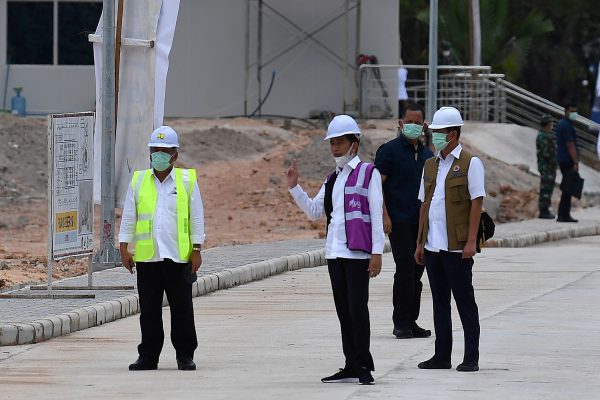Desperate to keep their economies humming, governments are launching expansive stimulus programs and ratcheting up spending. Widening budget deficits are being covered by a sharp rise in government debt — and countries blessed with budgetary surpluses are dipping into their precious reserves.
It is against this backdrop that Indonesia recently released its 2021 budget plan. But how can Jakarta afford to prop up its stalling economy without hurting its ability to tap global debt markets? Can the government better execute this year’s budget given the importance of its stimulus program?
Comparing the 2020 budget to last year’s, government revenue is expected to drop 13.3 per cent to Rp 1700 trillion (US$116 billion) due to COVID-19, while government spending through the stimulus program grew 18.6 per cent to Rp 2739 trillion (US$186 billion). This doubles the budget deficit to Rp 1039 trillion (US$71 billion) at 6.3 per cent of GDP and breaches the country’s 3 per cent GDP deficit limit, which has been lifted temporarily until 2023.
Assuming a slight recovery, the 2021 budget shows a 4.5 per cent rise in government revenue to Rp 1776 trillion (US$121 billion), while spending is kept more or less level at Rp 2748 trillion (US$187 billion). This is to shrink the deficit to Rp 971 trillion (5.5 per cent of GDP or US$66 billion) next year.
The first quarter of 2020 posted 3 per cent growth. But the economy contracted 5.3 per cent in the next quarter after social-distancing and work-from-home measures came into effect. The optimistic 4.5–5.5 per cent growth forecast for 2021 relies not only on a global economic recovery next year but also on the pandemic being under control by the end of 2020 — a highly uncertain outcome.
During his first term, Indonesian President Joko ‘Jokowi’ Widodo focussed on building the country’s neglected infrastructure — roads, ports, railroads and electric power — to attract foreign investment. In his second term, his focus will be on attracting investment through reforming labour laws, government bureaucracy and provincial permits. He will also seek to make changes to education and health to increase human capital.
The government is intent on passing an omnibus bill through parliament this year. The bill is an ambitious attempt to streamline a large number of investment-related laws to make them more business friendly. The most contentious of these is the generous severance pay ruling, which would be watered down under the new legislation.
But in this depressed economic environment, the bill is already attracting strong opposition from labour unions with sporadic labour demonstrations surfacing in several cities. There are also concerns about how much support the omnibus law will receive in parliament, with provincial elections looming in January 2021.
The 2021 budget strikes a balance between stimulating demand and strengthening productivity through supply side reform. Capital investment and other productive spending seem to have attracted more attention, while social security will receive an above-average allocation of funds.
These spending priorities reflect the government’s confidence in a return to normalcy next year, while recognising the limited ability of the bureaucracy to adapt to a rapidly changing environment. Jakarta has unfortunately failed to spend its allocated budget for this year, having only spent 32 per cent of its economic recovery disbursement with three months of 2020 to go.
Spending issues are in part a result of tighter governance requirements introduced to avoid improper disbursements, as well as a newly installed cabinet. The health and education ministries — which are allocated a large proportion of the budget — are led by two newly appointed ministers, Terawan Agus Putranto and Nadiem Makarim, both of whom have limited government experience.
With spending difficulties, the budget deficit might not be as large as expected. But managing rising government debt to cover the growing deficit remains a challenge. Added to this is the need to ensure the country keeps its credit rating so it can tap debt markets when needed. Standard & Poor’s have already altered the country’s BBB rating outlook to negative from stable.
Anticipating a more challenging debt market, Bank Indonesia (BI) has confirmed it would act as a lender of last resort, alarming markets about the central bank’s independence. But the government and BI quickly reassured the market that this ‘burden sharing’ would be a one-off exercise, that it would be limited in size and that its trade would carry market rates. The government’s debt level — expected to reach 41.1 per cent of GDP by 2021 — appears manageable with this in mind.
If the 2020 budget is anything to go by, Indonesia’s revenue shortfall, over which the government has little control, is not the biggest problem facing the country. New corporate tax incentives are expected to have a limited economic impact at a time when consumer demand is low. Some economists argue that these tax incentives would have been better allocated as part of the stimulus program to boost much-needed demand.
Indonesia’s biggest problem lies in the government’s ability to spend its budget promptly and effectively. This is critical during COVID-19, when the much-needed stimulus program needs to restart the economy by reaching individuals that need it most.
Even the best budgets have no meaning without an ability to realise them. President Jokowi’s cabinet has little time to address this pressing issue.
Manggi Habir is a visiting fellow at the ISEAS–Yusof Ishak Institute, Singapore.
Wisnu Wardana is an economist at Bank Danamon Indonesia.
This article is part of an EAF special feature series on the coronavirus crisis and its impact.

